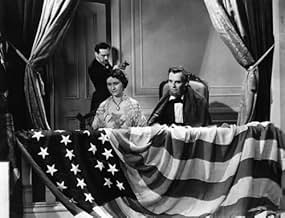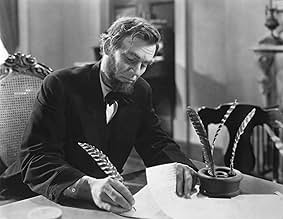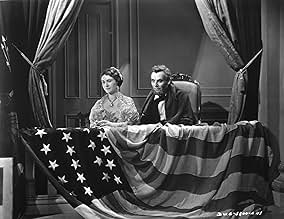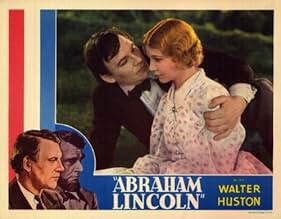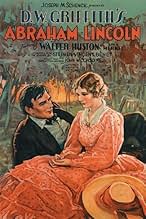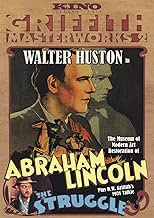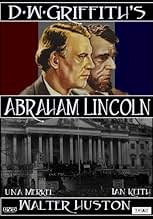IMDb-BEWERTUNG
5,7/10
1811
IHRE BEWERTUNG
Füge eine Handlung in deiner Sprache hinzuAn episodic biography of the 16th President of the United States.An episodic biography of the 16th President of the United States.An episodic biography of the 16th President of the United States.
- Auszeichnungen
- 4 wins total
William L. Thorne
- Tom Lincoln
- (as W.L. Thorne)
Edgar Dearing
- Armstrong
- (as Edgar Deering)
Jason Robards Sr.
- Herndon
- (as Jason Robards)
Cameron Prud'Homme
- John Hay - Secretary to the President
- (as Cameron Prudhomme)
James Eagles
- Young Soldier
- (as Jimmie Eagle)
Empfohlene Bewertungen
Before writing this review I saw that publicity driven line about this film. Abraham Lincoln is a lot of things, but NOBODY ever accused him of being a great romantic. All I can say there is, Huh?
Abraham Lincoln is one of two sound films made by movie pioneer, David W. Griffith. It's also something of an atonement for Griffith who was accused fostering racism with his masterpiece silent work, The Birth of a Nation.
Maybe if Abraham Lincoln had been a better film it would have succeeded in being an atonement. It certainly had one of the best interpreters of Lincoln ever in Walter Huston. The film also in many ways looks like a newsreel of the Civil War era. Our image of that era and you can see it in Ken Burns documentary comes from Matthew Brady's still photographs. In crafting this and The Birth of a Nation, Griffith was heavily influenced by Brady's still photographs.
Lincoln's prarie years were better told in Abe Lincoln in Illinois and Young Mr. Lincoln. Griffith should have stuck to the war years and made it in fact the Lincoln family story. One thing that would have done is eliminated Una Merkel as Ann Rutledge. Una Merkel had many a good role as a wisecracking dame in modern films. But in Abraham Lincoln she's just awful as Lincoln's lost love Ann Rutledge. It's a miracle she had a career after this film and a good one.
Abraham Lincoln is one of two sound films made by movie pioneer, David W. Griffith. It's also something of an atonement for Griffith who was accused fostering racism with his masterpiece silent work, The Birth of a Nation.
Maybe if Abraham Lincoln had been a better film it would have succeeded in being an atonement. It certainly had one of the best interpreters of Lincoln ever in Walter Huston. The film also in many ways looks like a newsreel of the Civil War era. Our image of that era and you can see it in Ken Burns documentary comes from Matthew Brady's still photographs. In crafting this and The Birth of a Nation, Griffith was heavily influenced by Brady's still photographs.
Lincoln's prarie years were better told in Abe Lincoln in Illinois and Young Mr. Lincoln. Griffith should have stuck to the war years and made it in fact the Lincoln family story. One thing that would have done is eliminated Una Merkel as Ann Rutledge. Una Merkel had many a good role as a wisecracking dame in modern films. But in Abraham Lincoln she's just awful as Lincoln's lost love Ann Rutledge. It's a miracle she had a career after this film and a good one.
It seems incredible the leaps and bounds that were made in less than ten years of cinema back some 90 years ago. D W Griffith's portrait of the great, noble pioneer in U.S politics has all the standard techniques and flourishes that now seem to have become the norm.
Walter Houston looks to be perfectly cast as 'Abe' - towering and dominant without being domineering and having that air of quiet authority. That he was humanitarian and resisted conflict whenever able to. It was nice also to have wife Mary's domestic quibbles thrown in, making this an interesting character study rather than a stiff history lesson.
As for history, no, I didn't learn a great deal, but didn't expect to. I wanted more to see how one of the great pioneering film directors portrayed another Great Man. The wonderfully produced epitaph in the final seconds showed testament to the power of them both.
Yes, the film's sound is hissy and pretty scratchy (I viewed it on-line at Internet Archive) but compared to most movies, certainly of that era and posted on that site, I found it surprisingly enjoyable and effortless.
Walter Houston looks to be perfectly cast as 'Abe' - towering and dominant without being domineering and having that air of quiet authority. That he was humanitarian and resisted conflict whenever able to. It was nice also to have wife Mary's domestic quibbles thrown in, making this an interesting character study rather than a stiff history lesson.
As for history, no, I didn't learn a great deal, but didn't expect to. I wanted more to see how one of the great pioneering film directors portrayed another Great Man. The wonderfully produced epitaph in the final seconds showed testament to the power of them both.
Yes, the film's sound is hissy and pretty scratchy (I viewed it on-line at Internet Archive) but compared to most movies, certainly of that era and posted on that site, I found it surprisingly enjoyable and effortless.
... "personally directed" by D. W. Griffith. Walter Huston stars as Lincoln, shown from his birth through his rough-and-tumble early years, his doomed romance with Ann Rutledge (Una Merkel), his marriage to the eccentric Mary Todd (Kay Hammond), and his election to the presidency, where he presided over the U. S. Civil War, during which he wrote the Emancipation Proclamation freeing the slaves, before being felled by an assassin's bullet.
Like most of Griffith's movies, this is a mixed bag of interesting choices, corny populism, and a rose-colored vision of the past. I was surprised by the opening of the film, set aboard a trans-Atlantic slave ship, featuring slave traders coldly discussing their remaining "inventory" as they toss a dead African overboard. As this was one of a few scenes missing its audio, I have a feeling it was often cut out during exhibition.
I was confused by Griffith's decision to cast E. Alyn Warren as both Stephen Douglas and Ulysses Grant: were there not enough qualified actors around? I liked seeing silent film stalwarts Hobart Bosworth and Henry B. Walthall as General Robert E. Lee and his attendant colonel, respectively. I liked Walter Huston as Honest Abe, and was surprised by how much he looked like the photographs of Lincoln in the last third of the film.
The biopic elements themselves are simplistic and hagiographic, and things seemed rushed, trying to tell his entire life story in 90 minutes. I was not a fan of Hammond as Mary Todd, and felt she dragged the proceedings down quite a bit.
Like most of Griffith's movies, this is a mixed bag of interesting choices, corny populism, and a rose-colored vision of the past. I was surprised by the opening of the film, set aboard a trans-Atlantic slave ship, featuring slave traders coldly discussing their remaining "inventory" as they toss a dead African overboard. As this was one of a few scenes missing its audio, I have a feeling it was often cut out during exhibition.
I was confused by Griffith's decision to cast E. Alyn Warren as both Stephen Douglas and Ulysses Grant: were there not enough qualified actors around? I liked seeing silent film stalwarts Hobart Bosworth and Henry B. Walthall as General Robert E. Lee and his attendant colonel, respectively. I liked Walter Huston as Honest Abe, and was surprised by how much he looked like the photographs of Lincoln in the last third of the film.
The biopic elements themselves are simplistic and hagiographic, and things seemed rushed, trying to tell his entire life story in 90 minutes. I was not a fan of Hammond as Mary Todd, and felt she dragged the proceedings down quite a bit.
If Griffith had stuck to Lincoln's personal life, this could have been an interesting, amusing, and occasionally insightful film. Griffith gives us a multi-layered and largely accurate portrait of Lincoln the man. We see the ungainly country lawyer, countrified in speech and manner, often serious, even melancholy, but with a rare ability to find humor in the most unlikely places and to laugh even at himself. We see Lincoln the inveterate story-teller, the insomniac, the doting father, the determined commander-in-chief the patient husband. If this had been the whole of the film, it would have been easy to overlook its painfully outdated style and to forgive its frequent omissions and exaggerations as poetic license.
Unfortunately, the film necessarily includes Lincoln's political life, and here it moves from poetic license to outright falsehood. Slavery was the central issue of Lincoln's political career, a fact that Griffith tries to obscure, going so far as to turn Lincoln's pivotal 'House Divided' speech into an argument against secession. This is particularly ironic since it was really Lincoln's battle cry against encroaching slavery. When South Carolinians seceded two years later, this was the speech they pointed to as proof that when Lincoln took office, "the slaveholding States will no longer have the power of self-government ... and the Federal Government will have become their enemy."
During Lincoln's presidency, the question of slavery occupied much of his time and attention, yet again Griffith chooses to ignore it. His Lincoln spends more time admiring the courage of Confederate soldiers than worrying about slavery. Even the Emancipation Proclamation gets only the briefest attention. Lincoln reads a line from the document, signs it, and says, "Well, gentlemen, it is done." It's oddly dismissive, coming from a man who considered emancipation the central act of his presidency and the most meaningful act of his life.
Denied his opposition to slavery and concomitant commitment to democracy and the inalienable rights of man, Lincoln is reduced to endlessly repeating, "The Union must be preserved." Why it must be preserved is left to the audience's imagination. The film never gives us the slightest clue.
Unfortunately, the film necessarily includes Lincoln's political life, and here it moves from poetic license to outright falsehood. Slavery was the central issue of Lincoln's political career, a fact that Griffith tries to obscure, going so far as to turn Lincoln's pivotal 'House Divided' speech into an argument against secession. This is particularly ironic since it was really Lincoln's battle cry against encroaching slavery. When South Carolinians seceded two years later, this was the speech they pointed to as proof that when Lincoln took office, "the slaveholding States will no longer have the power of self-government ... and the Federal Government will have become their enemy."
During Lincoln's presidency, the question of slavery occupied much of his time and attention, yet again Griffith chooses to ignore it. His Lincoln spends more time admiring the courage of Confederate soldiers than worrying about slavery. Even the Emancipation Proclamation gets only the briefest attention. Lincoln reads a line from the document, signs it, and says, "Well, gentlemen, it is done." It's oddly dismissive, coming from a man who considered emancipation the central act of his presidency and the most meaningful act of his life.
Denied his opposition to slavery and concomitant commitment to democracy and the inalienable rights of man, Lincoln is reduced to endlessly repeating, "The Union must be preserved." Why it must be preserved is left to the audience's imagination. The film never gives us the slightest clue.
I think it qualifies as a must-see film for all true scholars of the cinema. That is not to say that it is a good film. It is most certainly not. But this is really a perfect film in which to study the biggest change that this artistic medium ever experienced, the change from silence to sound. The whole film comes off as so, so awkward. It doesn't help that the script is awful. The film is actually over-ambitious, trying hard to cover the entire life of Abe, from birth to death. However bad Abraham Lincoln is, though, I myself found it more than watchable and always fascinating. 6/10.
Wusstest du schon
- WissenswertesThis was D.W. Griffith's first sound film. Abraham Lincoln (1930) was also the first sound film about the Civil War which veterans of that war could view.
- PatzerIn both the Union and Confederate parades, the musicians play trombones with forward facing bells. During the Civil War, the bells faced backwards.
- Zitate
[death scene]
Ann Rutledge: I know the truth, dear. It's goodbye.
Abraham Lincoln: No, no, Ann, dear. You're not going to leave me. I won't let you!
Ann Rutledge: We must be brave, dear...
[looking up to the heavens]
Ann Rutledge: Don't take me away. Don't take me away! It's so dark and lonesome!
Abraham Lincoln: Ann, you mustn't let go.
Ann Rutledge: If they'd sing, I wouldn't be so afraid.
[a chorus of "Sweet By and By" swells up in the background]
Ann Rutledge: We will meet there, dear.
- Alternative VersionenOriginally, this film was color-tinted in sepia-tone, with blue for night scenes. These prints also had a prologue. Current public-domain prints are in black and white, minus the prologue with a shorter running time.
- VerbindungenEdited into General Spanky (1936)
- SoundtracksBattle Hymn of the Republic
(ca 1856) (uncredited)
Music by William Steffe
Lyrics by Julia Ward Howe (1862)
Played during the opening credits and often in the score
Sung by an offscreen chorus during a civil war scene
Top-Auswahl
Melde dich zum Bewerten an und greife auf die Watchlist für personalisierte Empfehlungen zu.
- How long is Abraham Lincoln?Powered by Alexa
Details
- Laufzeit1 Stunde 36 Minuten
- Farbe
- Seitenverhältnis
- 1.20 : 1
Zu dieser Seite beitragen
Bearbeitung vorschlagen oder fehlenden Inhalt hinzufügen

Oberste Lücke
By what name was Abraham Lincoln (1930) officially released in India in English?
Antwort
